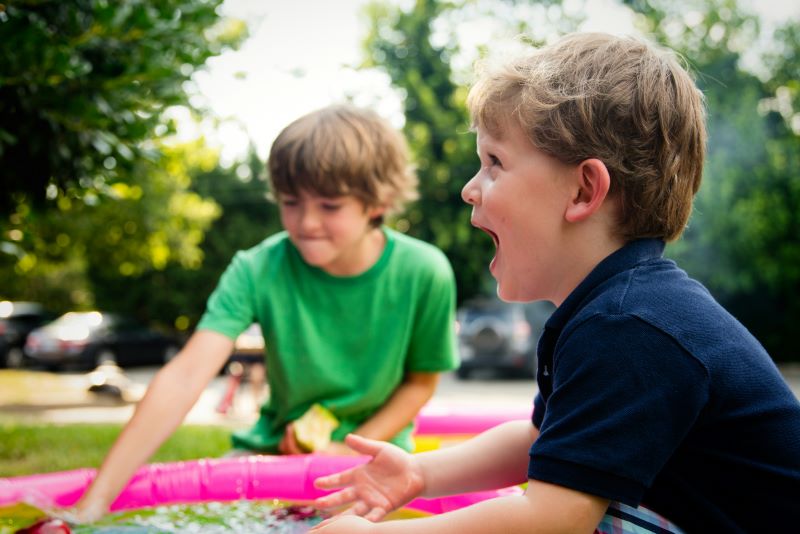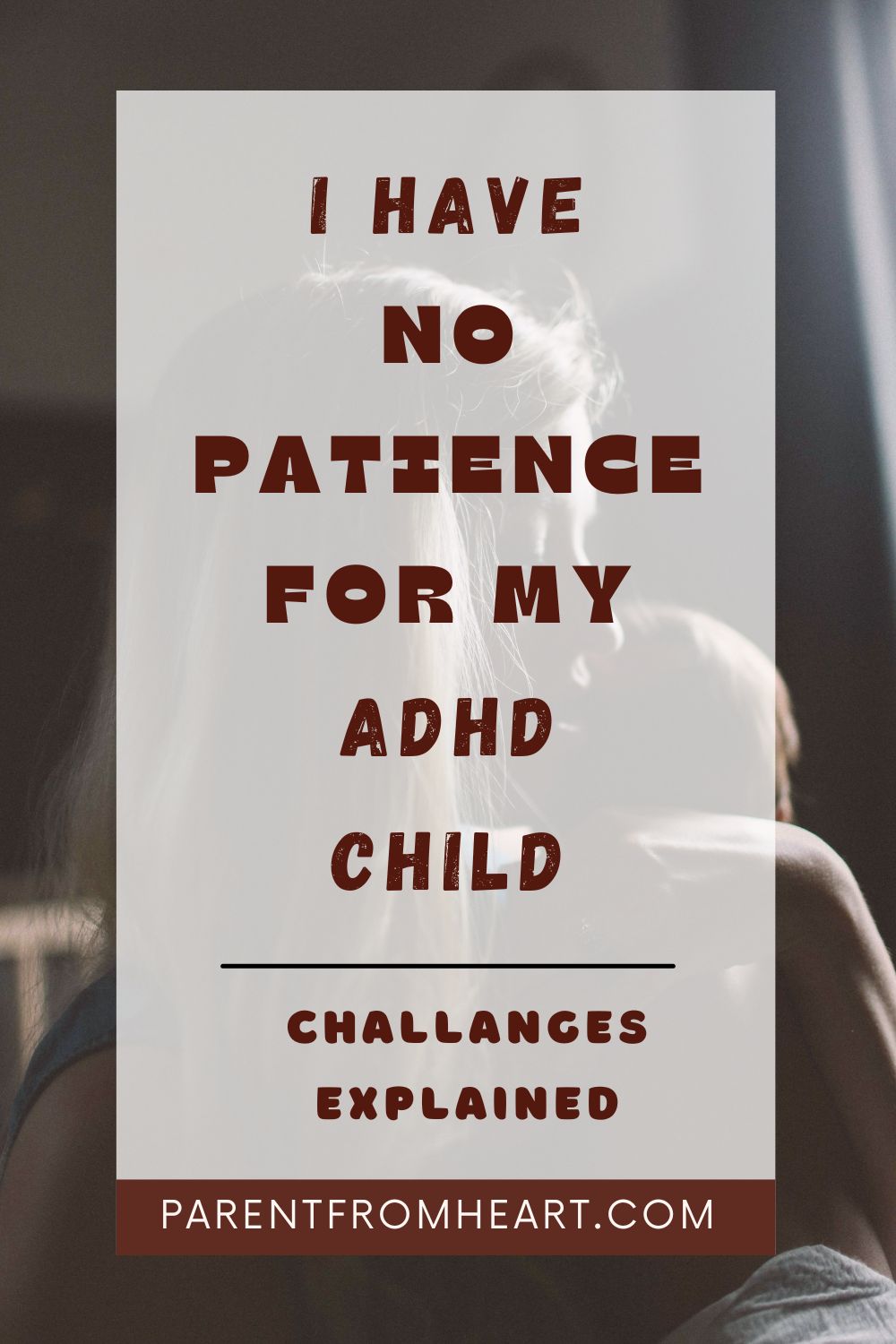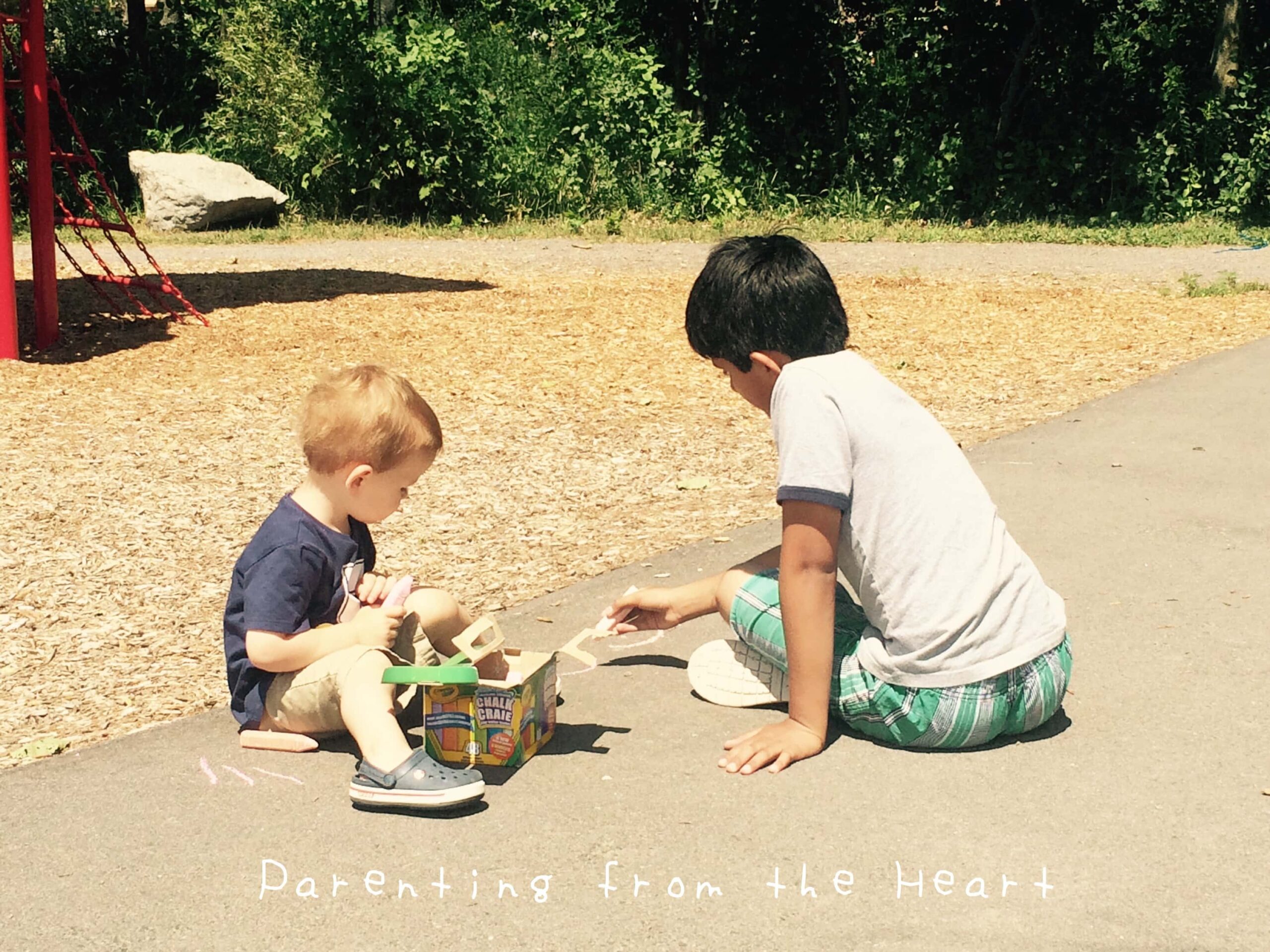Table of Contents
“Why do I have no patience with my ADHD child?”
If your child has ADHD, this might be a question you ask yourself often. Being frustrated and impatient with your child is a pretty awful feeling. You feel like a bad parent, and your child feels misunderstood and unheard.
Being angry and impatient can damage your bond with your child and make communication and cooperation so much more difficult.
But it doesn’t have to be that way. Yes, ADHD is a serious neurodevelopmental disorder. However, understanding what makes your child’s brain different can help you focus on their strengths and support their weaknesses.
Understanding ADHD

Attention-Deficit/Hyperactivity Disorder is a neurodevelopmental disorder that affects your child’s ability to focus, control their impulses, and regulate their energy levels. ADHD affects between 5-7% of kids and 2.5-6.7% of adults globally and is one of the most common mental disorders affecting kids, according to the American Psychiatric Association.
ADHD is complex and results from a combination of genetic, neurobiological, and environmental factors. It is 60-70% hereditable, which means there is a good chance you or your partner have ADHD. But it’s vital to understand that your child doesn’t have ADHD because of your parenting or the sugar you feed them.
Okay, that’s the official “science-y” version. But your ADHD child is so much more than a set of facts or statistics. Understanding ADHD basics is great, but they can only get you so far because your child will experience ADHD in a completely unique way. I repeat, your child is not a statistic, and ADHD is a complex and evolving situation that depends on your child’s unique symptom combination and temperament.
Types of ADHD
There are three major types of ADHD, and understanding each can help you learn more about your child’s unique challenges.
ADHD Impulsive/Hyperactive Type
Although ADHD, which presents with impulsivity and hyperactivity, is more common in boys, it is less common overall.
Your child may:
- Fidget
- Have excess energy and struggle to sit still
- Be extremely talkative and often interrupt conversations
ADHD Inattentive Type
Your child may not be hyperactive externally, but their brain may be racing. Kids with ADHD Inattentive Type struggle to focus and concentrate, often because their brains are busy.
Your child may:
- Get bored quickly
- Struggle following directions
- Be disorganized
ADHD Combined Type
ADHD, with a combination of hyperactivity and inattention, is the most common type, occurring in 70% of ADHD cases.
If your child has ADHD Combined Type, they will have at least six symptoms from both the other types. That means they may struggle with hyperactivity, impulsivity, and distractibility. You can find a symptom checklist here.
What Makes an ADHD Brain Different?
“I have no patience for my ADHD child!” you might say in exasperation.
But did you know your child’s brain is wired differently than a neurotypical one? The frontal lobe of our brains is responsible for planning, impulse control, and decision-making. The prefrontal cortex reaches maturity by about age 25. But an ADHD brain reaches maturity later. That means your child’s brain is developing slower than a neurotypical kid, making it highly challenging for them.
The frontal lobe is also in charge of something called “directed attention.” This is the focus you have when you’re doing a boring task like laundry or homework. Automatic attention is the focus you give to tasks you find fun and engaging. Kids with ADHD have strong automatic attention and really struggle with directed attention. So, if your child will spend hours building Lego or drawing but can’t finish their homework, there’s a very real “brain reason” why.
How Does ADHD Affect Families?
ADHD doesn’t just present a challenge for your child. It affects the whole family and can really shake up the dynamic in your home. How kids experience ADHD is individual, which means your ADHD experience is unique to your child and your family.
Life and Relationships
You may be angry and frustrated when your child misbehaves or doesn’t listen. You may even be embarrassed when your child acts inappropriately in public. The stress of raising an ADHD child is very real. In fact, the ADD Resource Center reports that many parents with an ADHD child experience more depressive symptoms and have more negative interactions with their child than parents of neurotypical kids.
ADHD also takes a toll on sibling relationships. Kids are narcissistic, which is developmentally appropriate. But it can make it really hard to explain ADHD to siblings who also get angry and frustrated. Unfortunately, emotional regulation is another skill kids are still learning, making tense situations even more explosive and challenging to de-escalate.
Misconceptions and Stigma
ADHD is tricky enough to deal with without the stigma that society loads on. Unfortunately, neurodiversity is still often seen as a problem to be fixed rather than a unique worldview to be celebrated.
Common ADHD Misconceptions
ADHD is just a lack of discipline: One of the most harmful misconceptions is the idea that ADHD is simply a result of poor parenting or a lack of discipline. Your child isn’t being willfully disobedient or showing a lack of discipline when they fail to complete their homework. What’s really happening is that your child’s brain is seeing boring tasks and saying, “No thanks.”
Kids with ADHD are lazy or unmotivated: Children with ADHD often struggle with executive functioning skills, which can make tasks like organizing, prioritizing, and completing assignments challenging. This can lead to the misconception that they are lazy or unmotivated when, in fact, they may be trying their best to work with a brain that wants none of it.
ADHD only affects boys: Although boys are more commonly diagnosed, that doesn’t mean girls don’t have ADHD. Many young boys present with hyperactivity, while girls show signs of inattention. Many girls go underdiagnosed (I mean, have you seen the social media wave of 30-somethings being diagnosed?) because they mask the symptoms well.
Kids with ADHD will outgrow it: ADHD is here to stay. Although your child won’t outgrow an ADHD diagnosis, they can learn to manage the symptoms and celebrate their unique strengths. Young boys with hyperactivity may notice that their hyperactive symptoms lessen during adolescence.
ADHD is just an excuse for bad behavior: ADHD is not an excuse for bad behavior! Kids with ADHD struggle with reactivity, emotional regulation, impulsivity, and positive social interactions. They aren’t choosing to be “bad.” They literally have a brain that makes “good” behavior a real challenge.
ADHD Challenges for Parents
People often talk about the struggles of having ADHD. But what about the challenges of raising a child with ADHD? Parenting is hard enough. But now you have to not only help your child find coping strategies, but you also have to learn patience and resilience as a parent.

How ADHD Affect Your Child’s Development
Your ADHD child may struggle with academics, emotional relationships, and friendships.
Their inattention and hyperactivity can interfere with friendships and classroom interactions, making school a challenging environment for them. ADHD can make them feel like the “other” as they work to fit in with the neurotypical world around them.
Kids with ADHD often
- Sleep less
- Receive more negative messaging
- Struggle with reactivity
- Find reading social cues a challenge
- Have poor time management
- Have more accidents
ADHD affects almost every aspect of your child’s life, including the bond they share with you. The wiring and firing in their brain are unique and can make the standard parts of child development more complicated.
Friendships, team games, classroom cooperation, and social interactions can be major challenges and leave you both frustrated and overwhelmed.
Unrealistic Expectations
You might find yourself impatient with your child because you have unrealistic expectations.
You expect your child to behave like neurotypical kids: You may compare your child to their neurotypical siblings or peers. But this is a road that leads to frustration and disappointment because your ADHD child’s brain works differently.
Believing that your child can “just focus” if they try hard enough: You may underestimate the impact of ADHD on your child’s ability to focus and concentrate. ADHD isn’t about a lack of willpower or effort but rather genuine neurological challenges.
Overestimating your child’s ability to self-regulate: Understandably, you want them to self-regulate their behavior, emotions, and impulses. However, ADHD makes self-regulation extremely challenging, even with your support.
Addressing your unrealistic expectations requires education, empathy, and understanding from you and your child. It’s a work in progress and something you will have to keep adjusting as your child grows.
The Emotional Toll of ADHD
Every parent spends time wondering if they’re doing it right.
Am I being present and catering to my child’s emotional needs? Am I being too harsh and reactive? Do I dismiss their feelings instead of validating them?
But when you have a child with extra needs and challenges, like ADHD, those questions, fears, and anxieties are doubled.
Having to be constantly on your parenting game is exhausting and can even lead to mom burnout. Social situations can seem like a minefield, and trying to successfully get through a school week can feel impossible. You are constantly managing your child’s behavior and trying to control your reactions in the process. It’s a lot.
External Judgment and Internalized Guilt
Part of the emotional toll parents face when raising an ADHD child is the constant judgment from others and the guilt they feel.
When your friends and family don’t understand your child’s neurodiversity, they can lay the blame for their behavior on your parenting or, even worse, on your child. That kind of judgment weighs heavily on both of you.
You and your child may experience stigmatization or discrimination because of misconceptions and stereotypes about ADHD. This can leave you feeling isolated and excluded.
Parental guilt is par for the course of having children, but ADHD can give you so much more to feel guilty about. Watching your child struggle to make friends or feel unhappy at school can be incredibly difficult.
You may even have internalized societal expectations about what it means to be a “good” parent and feel guilty when you can’t meet those impossible standards. Society makes you feel like you have to “fix” your child’s ADHD or minimize its impact. But you don’t have to change your child to make others feel more comfortable.
Embracing Neurodiversity

Having a child with ADHD means embracing neurodiversity.
But what is neurodiversity, really?
It just means your child experiences and interacts with the world in a unique way. It’s the idea that thinking exists on a spectrum and that there isn’t a right or wrong way to think. Neurodiversity celebrates differences rather than seeing deficits.
Reframing ADHD
Too often, we focus on the negative aspects of ADHD. But if you reframe your child’s behavior, you can start to see their strengths instead of their weaknesses. ADHD is a neurodevelopmental disorder that changes how your child thinks and processes information. But it doesn’t dictate what they can and can’t accomplish.
Here are some strengths your ADHD child has.
- Their impulsivity makes them spontaneous and helps them be grounded in the present moment.
- They have a higher tolerance for risk, exploration, and adventure.
- Their unique way of thinking makes them excellent problem-solvers.
- They see the world differently, making them more empathetic and accepting.
- They can hyperfocus on tasks, accomplishing more than neurotypicals in a faster time.
- They are creative, imaginative, and curious.

Working With Your Child
ADHD is serious, but it doesn’t have to be a disaster. There are science-backed strategies you can use to help your child thrive.
Parent Training
Research shows that your relationship with your child is crucial in helping them develop self-esteem and a positive self-image. Parent Behavior Therapy (BPT) is a highly effective strategy for helping families deal with an ADHD diagnosis. It’s a widely studied psychosocial intervention and one of the three most evidence-based ADHD treatments.
There are several different BPT programs, but they all focus on training parents to improve parent-child interactions, emotional communication skills, and consistent interventions. The most important part of BPT is finding a program that resonates with your family values and a therapist with whom you feel comfortable.
Connecting with your kids is an important part of parent training. You can read more about connection here.
Positive Reinforcement
Positive reinforcement is about praising or rewarding the behavior you want to see more of rather than focusing on “bad” behavior. It’s a powerful tool for shaping and encouraging positive behavior.
Spot Problematic Behavior: Pick a behavior you want to reinforce and get specific. For example, instead of saying, “Finish your homework,” try, “Please finish your English comprehension before dinner.”
Praise Quickly: Reinforcement should be immediate. For example, if your child finishes their English homework before dinner, praise them straight away instead of waiting until later in the evening.
Be Consistent: Consistency is crucial for success. When your child consistently gets a positive response to their behavior, the link between behavior and consequence strengthens.
Instructions
Your child’s brain struggles with following instructions, so keep them simple. Keeping your instructions simple and straightforward stops your child from feeling overwhelmed. It increases the chance they will do what you ask.
Break Down Tasks: Skip the instructions with multiple steps. Instead, give your child the instruction in manageable chunks. This reduces the cognitive load and helps your child actually complete the task.
Use Visual Aids: Charts, notice boards, and posters can help your child get through a routine or task more easily. Kids with ADHD are often visual learners, so visual aids can be more effective than verbal instructions.
Prioritize Information: Don’t bury the lead! Kids with ADHD have a short attention span, especially if what you say is boring (as most instructions are.) Give them the most important information first, and be specific about the details.
Boundaries and Consequences
Boundaries create structure and give your child a sense of safety. Consistent boundaries introduce predictability, something your spontaneous and impulsive child desperately needs to thrive.
Back your boundaries up with logical consequences. Logical consequences are directly related to the behavior you want to change. They help your child learn decision-making skills and help them take accountability for their actions.
Boundaries with logical consequences work well for kids with ADHD because they are immediate and offer a real-time response to an action. They also focus on solutions rather than problems, ideal for your little problem-solving wizard.
Be calm and consistent, and ensure the consequence is relevant to the broken boundary.
I Have No Patience For My ADHD Child: But I Can Learn To
Raising a child with ADHD can feel like an enormous task. But like anything in life, you can learn how to parent your unique child in a way that builds them up without leaving you broken.
You can learn patience by reframing your child’s behavior and focusing on what makes them special. But a big part of being more patient with your child is having patience with yourself.
You’re not going to get it right all the time, and you’re not supposed to. No parent is. But you can show up for your child with love, empathy, and respect for the person they are and the person you are helping them to be.
Do you have a child with ADHD? I would love to hear if there are things you struggle with or strategies you’ve found that help.











